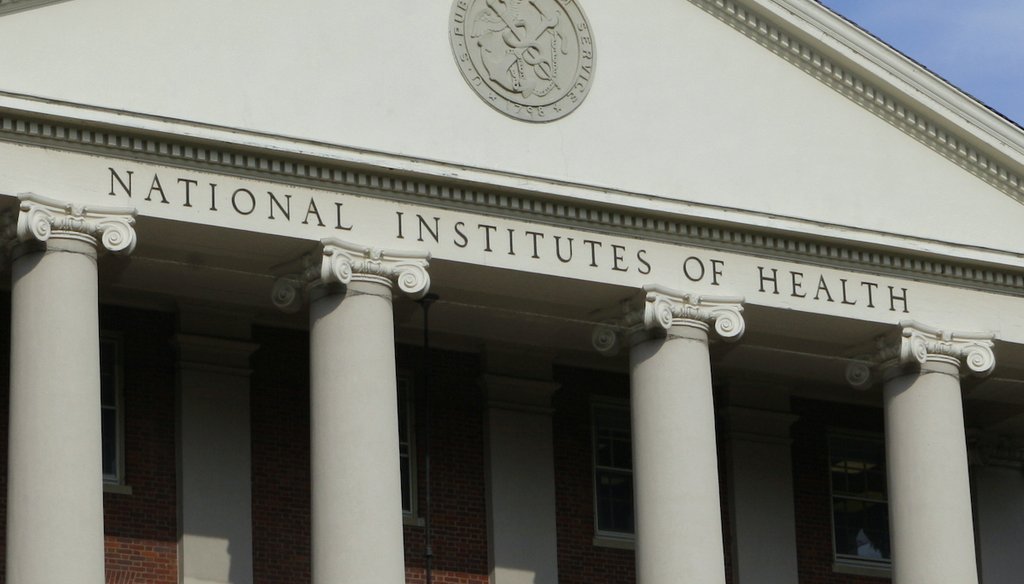Stand up for the facts!
Our only agenda is to publish the truth so you can be an informed participant in democracy.
We need your help.
I would like to contribute

Social media posts misleadingly characterized details surrounding research out of the University of Pittsburgh that received some funding from the National Institutes of Health. (AP)
If Your Time is short
• “Humanized” rodents, or rodents engrafted with functional human cells and tissues, are often used to study human diseases.
• Research by scientists at the University of Pittsburgh was supported in part by branches of the National Institutes of Health.
• There is no evidence Dr. Anthony Fauci, director of the National Institute of Allergy and Infectious Diseases, was directly involved in the research being scrutinized.
Social media posts have accused Dr. Anthony Fauci of purchasing "severed heads of aborted babies" and grafting "their scalps onto lab rats."
The headline of an article on the conservative website Gateway Pundit reads, "Dr. Fauci is Funding Gruesome University of Pittsburgh Study Skinning Scalps off of Aborted Babies and Growing them on Lab Rats." The website published a video that says the university appears to have an agreement with Planned Parenthood to obtain fetal tissues.
An article from the Center for Medical Progress — an organization that has posed as researchers to secretly record encounters with Planned Parenthood in the past — claimed that "Local Planned Parenthood of Western Pennsylvania abortion providers" supplied the fetal tissue.
While the claims reference a real study, they misleadingly characterizes Fauci’s relationship to the research, incorrectly links the study to Planned Parenthood and falsely claims fetal tissues were purchased.
These claims emerged following the discovery of research conducted by scientists at the University of Pittsburgh.
The paper, published in September 2020 and titled "Development of humanized mouse and rat models with full‑thickness human skin and autologous immune cells," has become the focus of scrutiny and criticism.
The research aimed to create mouse and rat models "with human skin, along with autologous lymphoid tissue(s) and autologous immune cells" for the purpose of potentially providing "a means of studying the human immune response to infection in the human skin."
The use of the term "humanized mice" in medical research isn’t uncommon. It refers to "immunodeficient mice engrafted with functional human cells and tissues," according to other research on the topic.
Studies describe the process as "increasingly important" for studies of infectious diseases and cancer — an "alternative to in vitro studies with human tissues and nonhuman primates for the study of human immunobiology."
According to the paper that this claim appears to be referencing, researchers co-engrafted immunodeficient mice and rats with "fetal skin, autologous fetal lymphoid tissues, and autologous fetal liver-derived hematopoietic stem cells."
Fetal tissue refers to tissue or cells obtained from a human embryo or fetus "after a spontaneous or induced abortion, or after a stillbirth," according to a Congressional Research Service report. Autologous means the tissues have been collected from the same specimen.
In the "ethical approval" section of the University of Pittsburgh study, the researchers reported that the human fetal tissues used were "at the gestational age of 18 to 20 weeks" and "were obtained from medically or elective indicated termination of pregnancy." The researchers also said that all maternal donors provided written consent.
After the grafts, scientists monitored the rodents for weeks and documented the developments with photos — some of which have been shared online. Some of the photos show human hair growing alongside mouse fur.
Ultimately, the researchers concluded that the rodents support the development of full-thickness human skin, autologous immune cells and autologous lymphoid tissues and that they "support human skin infection" when injected with it.
The finding "could provide a platform for studying human skin infections," the paper said.
The research was at least partially supported by various branches of the National Institutes of Health, according to the paper’s acknowledgments section.
Researchers indicated that two divisions of the NIH — the National Institute of Allergy and Infectious Diseases and the Fogarty International Center — supported the study.
The NIAID funding — about $235,000 in 2019 — supported four separate studies that collectively aimed to "create a novel animal model with human tissues and organ system to address critical knowledge gaps" in Staphylococcus aureus disease, such as MRSA.
The NIH funding database described Staphylococcus aureus disease as "a major of cause of morbidity in the United States" and "a major public health threat" because it has a high probability of being severe and is increasingly drug-resistant.
The Fogarty International Center funding came from a pool of about $303,500 in 2019 that supported several efforts to train Indian healthcare professionals and research scientists, according to the NIH’s funding database. The funding ultimately supported seven published studies, of which this was one.
"Fogarty International Center provided support for scientists from Hyderabad, India, to receive research training to develop skills to combat HIV/AIDS, TB and other infectious diseases through a partnership with the University of Pittsburgh," the Fogarty International Center said in a statement to PolitiFact. "The India-based LEPRA Society is a 90-year-old non-governmental organization providing healthcare services to rural populations of India inflicted with TB, Leprosy, HIV and malaria."
Claims that Planned Parenthood supplied the fetal tissues used in the experiments are false, according to the study.
Researchers indicated that the fetal tissues were donated, obtained through pregnancies terminated at the Magee-Womens Hospital of the University of Pittsburgh Medical Center, working with the university’s Health Sciences Tissue Bank.
Kevin Zwick, a spokesperson for the University of Pittsburgh, said the university "does not obtain tissues from Planned Parenthood."
There is also no evidence that Fauci was directly involved in this research at all — beyond generally running the NIAID.
Finally, there is no indication that the fetal tissues used in the experiments were "purchased," as the posts claim. Zwick confirmed that the tissues used in the study were donated.
"The NIH and PA Abortion Control Act expressly forbid entities from profiting off of the collection and transfer of fetal cell and tissue donations," Zwick said.
He said the university follows all federal regulations regarding research using fetal tissues and also follows Pennsylvania’s regulations, which Zwick described as "among the most restrictive in the country."
Zwick also pointed to a university policy that mandates "No remuneration, compensation or other consideration of any kind may be offered to a woman to consent to the use of fetal tissues for research."
Our Sources
Facebook post, May 27, 2021
The Gateway Pundit, "Dr. Fauci is Funding Gruesome University of Pittsburgh Study Skinning Scalps off of Aborted Babies and Growing them on Lab Rats (VIDEO)," May 6, 2021
Scientific Reports, "Development of humanized mouse and rat models with full‑thickness human skin and autologous immune cells,"
National Center for Biotechnology Information, "Humanized mouse models of clinical disease," Dec. 5, 2016
National Center for Biotechnology Information, "Humanized Mice as Unique Tools for Human-Specific Studies," Feb. 7, 2018
The Journal of Infectious Diseases, "Overcoming Current Limitations in Humanized Mouse Research," Nov. 15, 2013
Congressional Research Service, "Human Fetal Tissue Research: Frequently Asked Questions," accessed June 14, 2021
National Institutes of Health RePORTER, "Project details: Modeling Staphylococcus aureus infection and pathogenesis in humanized mice," accessed June 15, 2021
Email exchange with a spokesperson for the Fogarty International Center, June 14
Email exchange with Kevin Zwick, spokesperson for the University of Pittsburgh, June 16
University of Pittsburgh, "Research Involving Pregnant Women, Neonates, and Fetuses," accessed June 16
U.S. Centers for Disease Control and Prevention, "Staphylococcus aureus," accessed June 15, 2021
National Institutes of Health RePORTER, "Project details: Pitt HIV-TB research and training program in India," accessed June 15, 2021
The Center for Medical Progress, "Fetal Experimentation at the University of Pittsburgh and Planned Parenthood," accessed June 15, 2021
Fox News, "On the 48th anniversary of Roe v. Wade, questions remain in Planned Parenthood controversies," Jan. 22, 2021






























